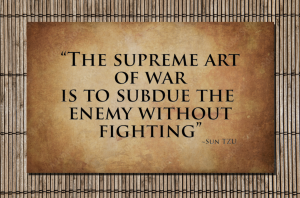By: Skott Schoonover, Strategy Analyst | 04/14/2022 |
“If you know the enemy and know yourself, you need not fear the result of a hundred battles. If you know yourself but not the enemy, for every victory gained you will also suffer a defeat. If you know neither the enemy nor yourself, you will succumb in every battle.”

― Sun Tzu, The Art of War
The first time I heard those words, I instantly had to find out who said it, and buy the book to find out what else was in it.
Little did I know I was purchasing one of the greatest strategy guides in the history of humanity.
The Art of War was written in the 5th Century BC by Sun Tzu. While initially written as a literal guide to war strategy, today it has many non-military applications including Business, Sports, and even Relationships. It has 13 separate chapters, each with a focus on a specific aspect of planning for and managing conflict. Many of these are broken down into every individual factor or variable which may occur, and how to prepare for each. It is an all-encompassing guide that accounts for all intricacies and edge cases.
It teaches the value of planning, costing, and assessing the value of a project. It discusses the importance of Creativity, Flexibility, and Contingency Planning. And it emphasizes the necessity of good Information, being Brilliant at the Basics, and Honest Self-Assessment.
What I enjoyed most about The Art of War was that I found it to be more of a Thought-Provoking piece, than an Inspirational Manifesto. While it explains that a great leader will win the hearts of their army, the book does not rely on the emotions of the reader. It does not depend upon the Reader’s adrenaline for impact, but rather shows the value of being able to temper your passion and approach tasks with a clear mind and a well-thought-out plan.
As it pertains to the quote above, I still remember standing in a row of books at Barnes and Noble pouring through those pages and coming across this quote. It was one of those “Aha!” moments where I was introduced to a thought that I hadn’t contemplated before. I realized that things I had used as excuses were actually Areas of Opportunity. The only way to guarantee my own success was to put in the hard work to make self-improvements.
In my opinion, there are helpful pieces of this book that can be applied in almost every situation. If nothing else, I highly encourage everyone to read The Art of War for the myriad of quotes that have inspired people for the past 2,500 years and see which one moves you.
